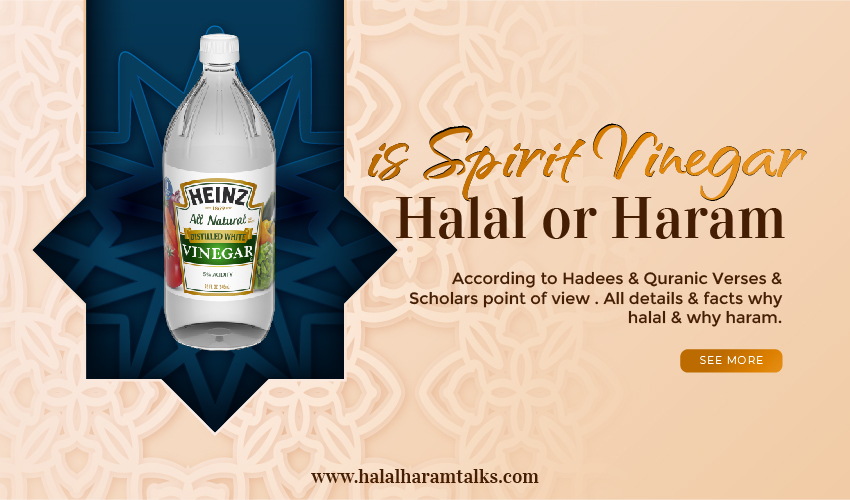Vinegar is a widely used ingredient in various cuisines around the world. It is primarily made through the process of fermentation, which involves converting alcohol into acetic acid. However, when it comes to determining whether spirit vinegar is halal or haram, there has been some confusion among Muslims. In this article, we will delve into the topic of spirit vinegar in detail to provide a comprehensive understanding of its halal status.
Is Spirit Vinegar Halal or Haram?
The term “spirit vinegar” refers to a type of vinegar that is made from the fermentation process of distilled alcohol. There are differing opinions among scholars regarding the permissibility of spirit vinegar. Some argue that since it is transformed through a fermentation process, it undergoes a complete transformation, making it halal. On the other hand, some scholars consider it haram due to its initial source being alcohol.
For More Ideas: Is Balsamic Vinegar Halal Yes/No
List of Ingredients Used in Spirit Vinegar
To understand spirit vinegar better, it is crucial to examine the ingredients involved in its production. The following ingredients are commonly used in the production of spirit vinegar:
- Sugar/Starch: Spirit vinegar production often involves the fermentation of sugar or starch sources derived from various plants.
- Yeast: Yeast is utilized to convert the sugar content into alcohol during the fermentation process.
- Distilled Alcohol: The alcohol used in the production of spirit vinegar is typically distilled to remove impurities.
Quran Verse or Hadith Referring to the Halal or Haram Nature of Spirit Vinegar
The Quran and Hadith provide guidance on many aspects of halal and haram consumption. Unfortunately, there are no specific references that explicitly mention the permissibility or prohibition of spirit vinegar. In the absence of a specific reference, it is essential to refer to general principles established in Islamic jurisprudence.
One of the primary principles in determining the halal or haram nature of a substance is its transformation. Islam allows the consumption of substances that have undergone a complete transformation from their original state. Considering that spirit vinegar is produced through a fermentation process that converts alcohol into acetic acid, it can be argued that the transformation qualifies it as halal.
For More Ideas: Is Vinegar Halal: [A Complete Guide]

Is Spirit Vinegar in Mayonnaise Halal?
Mayonnaise is a popular culinary condiment that often contains vinegar as one of its ingredients. The halal status of mayonnaise depends on the specific type of vinegar used. If the mayonnaise contains spirit vinegar, which is alcohol-derived, it will not be considered halal. However, if it utilizes other types of halal vinegar, such as apple cider vinegar or malt vinegar, then the mayonnaise can be deemed halal.
For More Ideas: Is Rice Wine Vinegar Halal
Is Spirit Vinegar Halal in the UK?
The halal certification process in the UK follows strict guidelines to ensure products adhere to Islamic dietary laws. Regarding the halal status of spirit vinegar in the UK, the debate continues among scholars. However, many halal certification bodies in the UK consider spirit vinegar permissible due to its complete transformation during the fermentation process.
For More Ideas: Is Wine Vinegar Halal: A Proper Insight
Is Distilled Vinegar Halal?
Distilled vinegar, similar to spirit vinegar, is derived from an initial source of alcohol. The production process involves distilling the alcohol, resulting in a colorless liquid. As with it, there is a difference of opinion regarding the halal status of distilled vinegar. Some scholars consider distilled vinegar halal due to its complete transformation, while others maintain a cautious approach and avoid it altogether.
For More Ideas: Is Prime Drink Halal: An Authentic Guide
Is Spirit Vinegar Halal According to Primary Schools of Thought?
The four primary schools of thought in Sunni and Shia Islamic jurisprudence are as follows:
- Hanafi School: According to the Hanafi School, spirit vinegar is generally considered halal due to the complete transformation that occurs during its production process.
- Shafi’i School: The Shafi’i School shares a similar view to the Hanafi School, considering spirit vinegar permissible based on its transformation.
- Maliki School: The Maliki School takes a more cautious approach, deeming spirit vinegar haram due to its original source being alcohol.
- Hanbali School: The Hanbali School also adopts a cautious stance, considering spirit vinegar haram due to its origin as alcohol.
For More Ideas: Is Vanilla Extract Halal: All You Need To Know
The Role of Certification in Determining the Halal Nature of Spirit Vinegar
Certification plays a crucial role in determining whether a product, such as it, is halal. Halal certification bodies conduct thorough inspections and assessments of the production processes to ensure compliance with Islamic dietary laws. In the case of spirit vinegar, certification bodies scrutinize the source of alcohol used and the extent of transformation during the fermentation process. Certified halal spirit vinegar provides Muslims with confidence in its permissibility.
For More Ideas: Is Red Bull Halal: All You Need To Know
FAQs
A1: The halal status of it is still debated among scholars. While some argue that its transformation during the fermentation process makes it permissible, others view its initial source of alcohol as problematic. Muslims who adhere to a strict halal diet may choose to avoid using spirit vinegar altogether to err on the side of caution.
A2: To determine if a product containing it is certified halal, look for accredited halal certification symbols on the packaging. These symbols indicate that the product has undergone rigorous inspections and meets the requirements set by recognized halal certification bodies.
A3: Yes, the halal status of it can vary across different countries due to variations in interpretations of Islamic dietary laws and certification processes. It is essential to refer to local halal certification authorities or seek guidance from knowledgeable scholars to ensure compliance with regional halal standards.
Conclusion
The halal status of it remains a topic of debate among scholars. While some view it as permissible due to its transformation during the fermentation process, others express caution due to its initial source being alcohol. Muslims who adhere to a strict halal diet should exercise their own judgment and seek guidance from certified halal certification bodies or knowledgeable scholars.
It is important to note that understanding the halal and haram aspects of various food ingredients is crucial for Muslims. To delve deeper into this subject and gain more insight, visit our website, which provides comprehensive information on halal and haram matters in Islam. By educating ourselves and making informed choices, we can ensure that our dietary practices align with our religious beliefs.
